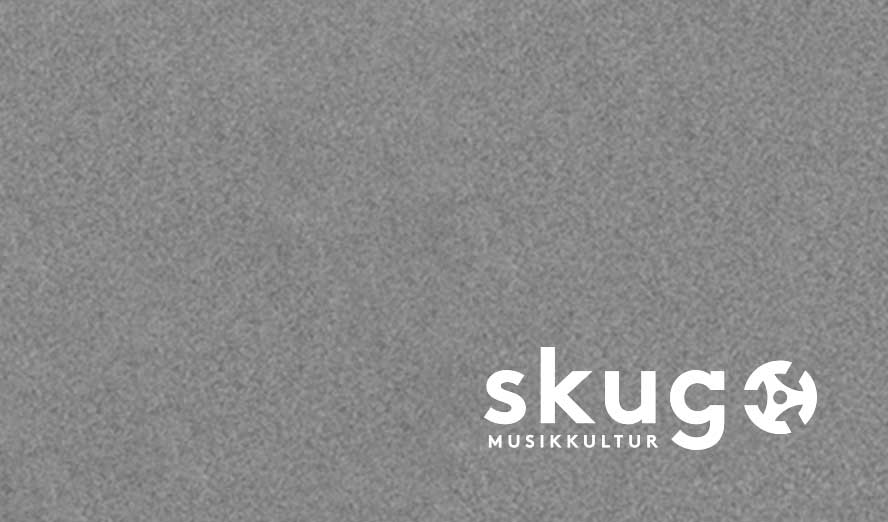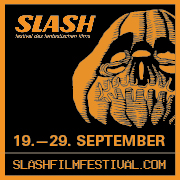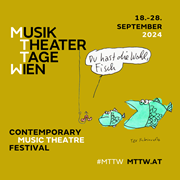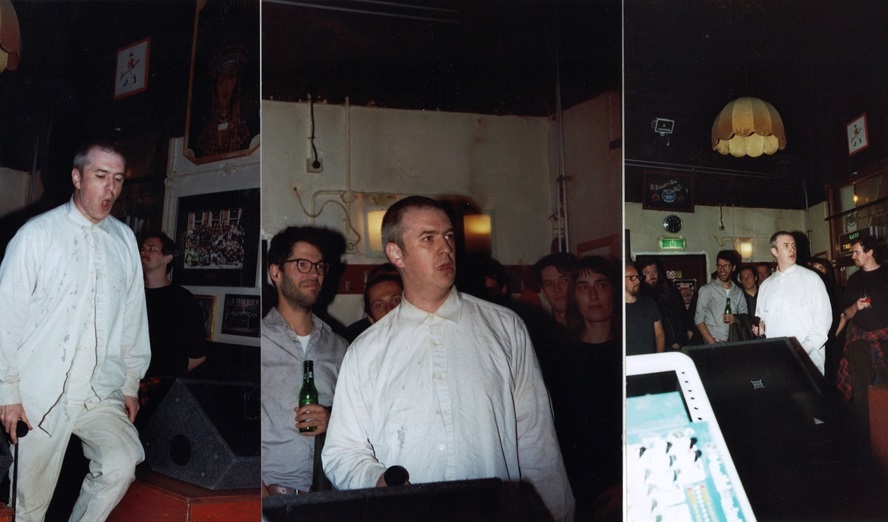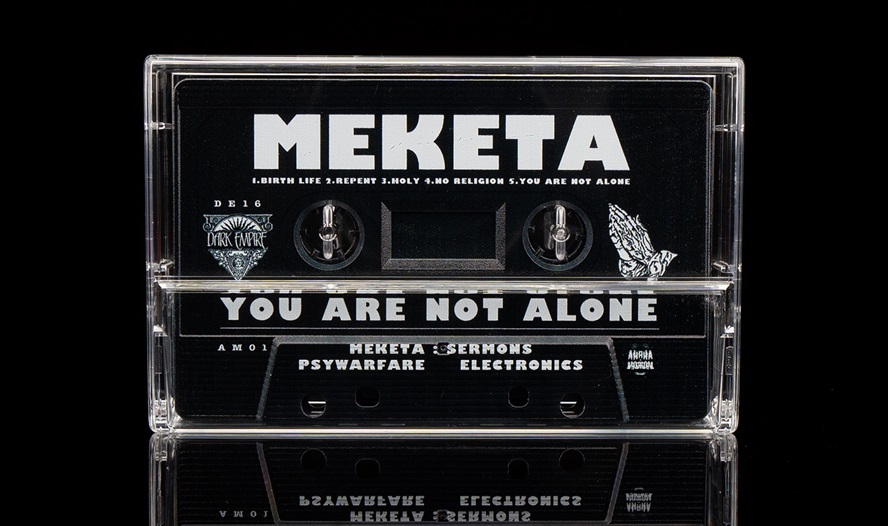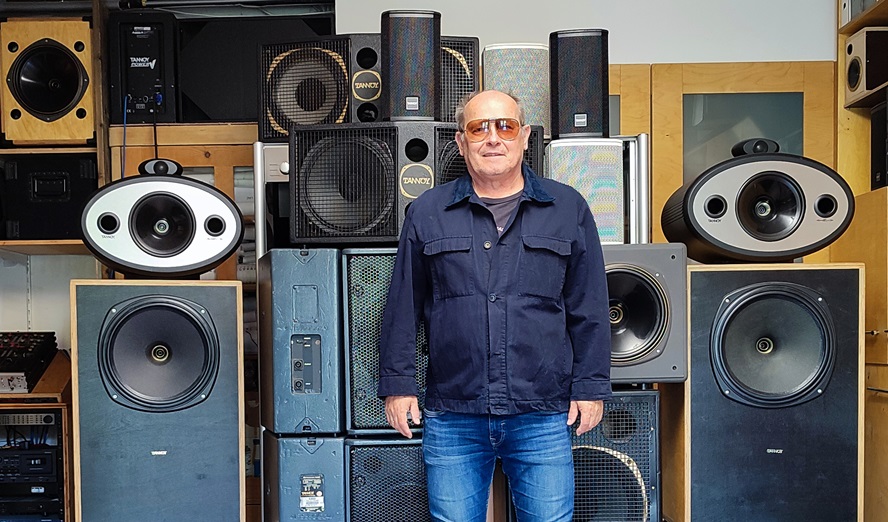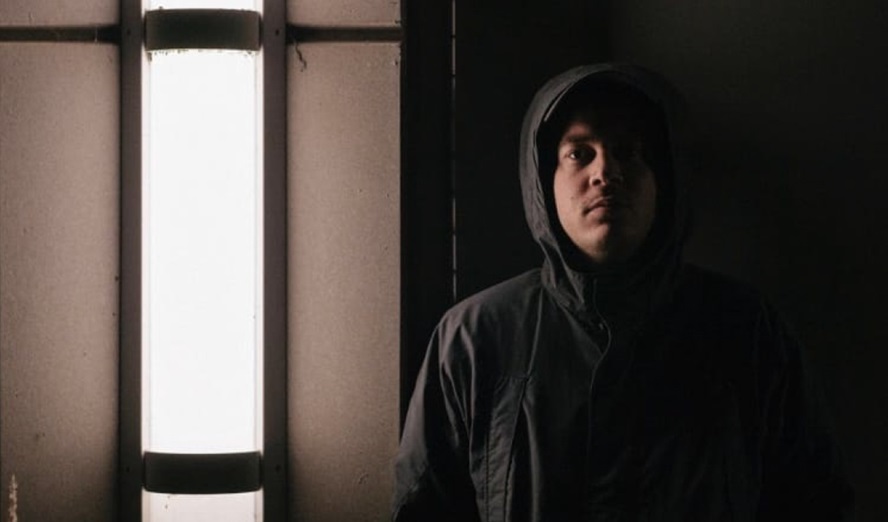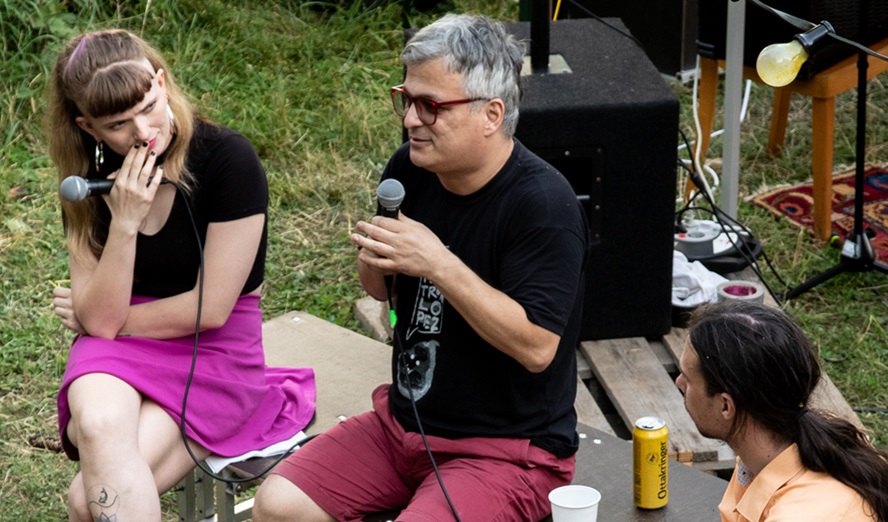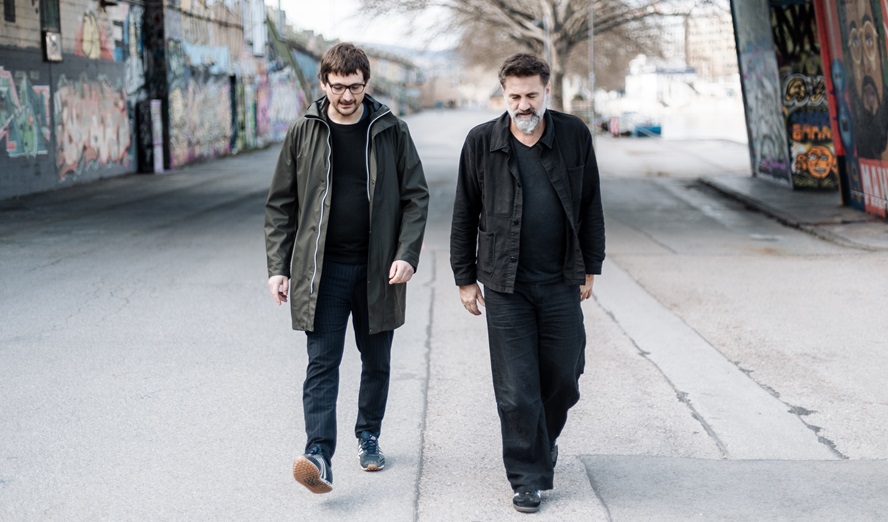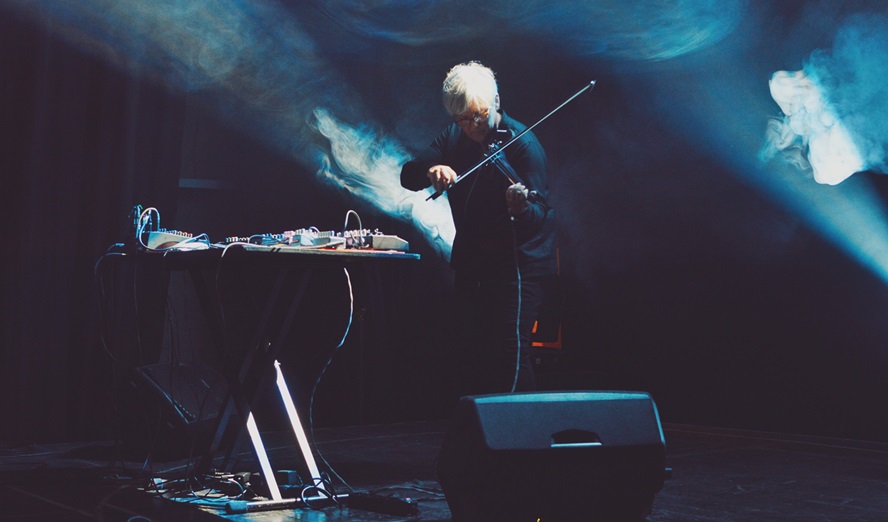If you compare the Austrian underground music landscape with a tennis match – rock versus techno – the current score would be breakball for techno. Another comparison for people who don’t like tennis: house in relation to techno is like going to a house party in a stylish but slow VW beetle, then getting into a Porsche Turbo and taking off into the space jungle. The activities in the scene were never as simultaneous and varied as today. Obviously most of the people had their initial techno moments in 1991 and 1992 and that now bears fruit. Strange things sometimes happened at afterhour parties at the Arena in Vienna, when all of a sudden the remaining head bangers or punks from a Badland Massacre or Trash Disco event joined for a techno meeting, took a seat in front of the boxes and thought whether they should like this or not. According to reports many of them got into it in the end. What exactly happens here?
Change of paradigms or »music is a flowing art form« (Ralf Hütter 1987)
If you study the beginnings of techno in Austria, you will definitely come across Konrad Becker. Already in 1979 Becker used sounds in his tapes, soundtracks and records (Monotonprodukt 01 to 07), which come close to today’s state of the art. »Experimental dub, industrial and the beginnings of house as well as Suicide, Robert Rental and all those things which then happened at the same time, were my inspirations«, Becker says. »Today a change of paradigms can be observed as for the first time the old Anglo-American rhythm ’n‘ blues is rather going down the drain, being replaced by an international world music language with multicultural influences of all kind. It’s an interesting phenomenon that many prophecies from a more academic-compositional point of view become true and are being realized in this kind of music.«
The mainstream music understanding has not become aware of the fact yet that techno – although its end is often predicted by the media, etc. – represents a world-wide movement progressing every month, following new ways and forming interesting coalitions. The revolutionary thing about it is the breaking with traditional song structures (verse, chorus), the abandonment of the artist’s ego and of the message. The emphasis on corporeality is in fact nothing new, however, it breaks with communication (see soul music) and is rather heading towards an extreme self experience. Techno enthusiastically absorbs the principles of the »Futuristic Manifest« of 1913 and develops an insatiable desire for speed and innovation. Due to the fact that techno provides only a few ideas, the recipient has the chance to create his own filter. It’s obviously an extreme phenomenon of perception – techno totally wraps up the listener, more than every rock concert does. Techno is the most extreme consequence of the anti-star attitude of disco, even more than house and dancehall which neither constitute citadels of stars. The dictatorial rhythm, often abused as a point of criticism (fascistic, comparison with march music, etc.), enables the individual to take a journey into space on a musical guiding beam and to experience the adrenaline rush or a so-called flow adventure of a special kind. »The dancers live in their own world, freed from the characteristics applying to pop, such as artist, vision, concert, text, criticism« (rock critic guru Robert Christgau in Village Voice on techno).
The often expressed opinion that electronic music per se had to be cold, robot-like and limited in its ways of expression, is a rather conservative point of view. In times of grunge fashion, neo hippie romanticism of a horde of very young too-late borns and the common unplugged phenomenon (music as handicraft), the confrontation »diary = song« versus binary emotional snapshot totally breaks out. The outcry: »But that’s not music« traditionally performed every 10 years, as in the case of punk and hip hop, comes back with a vengeance and is especially performed by the generations formerly concerned. Another phenomenon often observed is that, for example, former rock musicians like BASK or KARG become completely wrapped up in this music, sell their instruments and now produce techno. Under the project name MF1 the two musicians Ramon and Duke (ex-Slim Jim, ex-Karg and ex-Trelkovsky) released their first maxi single on the Mainframe label. Mainframe (by the way, the name was created by DJ Glow) is one of the four new Vienna labels which were founded several weeks ago. Apart from Ramon and Duke there are DJ Tin and Peter (ex-Sony). When the two drummers announced that they would like to produce, several Vienna DJs were eager to do it (Glow and DJ L.X., the breakbeat specialist).
»It was obvious that we would need the advice and participation from the DJs since we had no idea about dancefloor, techno or house. The Night of Interference (Becker’s last year’s tranceport event with Underground Resistance, Jeff Mills and Tanith at the Vienna Academy of Fine Arts) was our initial moment«, says Duke. »Indie just bored us. The techno scene has more life, it’s full of power and the people immediately accepted us. Besides, there are big differences in the way of producing. The studio costs in the rock music business are much higher and it takes more time in general. This music is not based on things like that. It doesn’t really matter whether it is produced in a studio or on an Amiga computer«, Peter says. Their former work in the rock context naturally influences the music and stimulates it. »On the track ›Uncle Crisby‹ from the XXX sampler you really notice that the bassline wasn’t created by a DJ.« Apart from giving musical advice and making judgements, Mainframe man Martin is also responsible for designing the covers. »I also started with techno last year. However, I used to play in clubs, e.g. in Malaga, and the music at that time ranged from industrial to hip hop. I’ve always been fond of electronic music, ›Electric Salsa‹ by OFF (the first production of today’s trance king Sven Väth) was one of my favorites.« According to the program the label shall be open for all directions. »We decide what we want to produce. The most important criterion is if it’s suitable for clubs. Another advantage of owning a label is having it all under control«, states Martin, the current organizer of Space Jungle.
»I like the way they abuse machines« (Mark E. Smith / Fall)
This leads us to an original label which already contains Smith’s characterization in its name, Abuse Industries as ground station of two new labels named Morbid and Cheap, which are sent into the orbit by Patrick and Duffy. »Morbid rather releases material for home listening or chill out clubs, i.e. rather melody-oriented stuff. In contrast, Cheap – as the name already says – shall rather release ›ruff and cheap‹ material for DJs. This is due to our two different temperaments, I represent the melodious spectrum and Patrick the percussive one«, says Duffy. The idea for Morbid was born in New York because Patrick spent seven months there producing for the label Votex. »We produce everything in our own studio in order to avoid being restricted in our creativity. We listen to the stuff people are offering us. If we like the sound, if it’s funny and inspired, we release it«, says Duffy. »Morbid is all about floating, leaving the final interpretation to the people. And in case of Cheap it’s the willingness to drive. ›Hard but hearty‹ is another motto we like. We already started earlier, the first production was ›b.low‹ on Abuse. The next CD is going to be released on Abuse again. Establishing four to six labels in Vienna would be great, because then we could compete with the Germans. Also the techno heads in Graz, Linz and wherever would no longer be afraid to do something«, Duffy is convinced.
Patrick has similar roots like the other Vienna protagonists. »Kraftwerk and the beginnings of hip hop (where a long time ago there had been an interesting movement called ›Electro‹, see ›Street Sounds Compilations‹), although I didn’t like the lyrics. However, I completely got into acid house.« Although New Beat and Electronic Body Music (EBM) constituted certain precursors of the current playing styles, there was no clear line and the song structures, which have almost disappeared these days, still prevailed. Disco’s love-child, house, was the force behind. The huge number of terms used causes confusion amongst the outsiders. Insiders distinguish between techno and acid as it is meant today. Acid, presented for the first time by Phuture’s 12″ »Acid Trax«, is actually a bassline programmed on the Roland 303. (Remarkable the fact, by the way, that at the moment an acid revival in the techno scene takes place).
In 1988 the acid-house hysteria started in London (and could also be observed at the Vienna Kennedys and U4), then, as always, it was hyped to death by the media and now a new revival with the Harthouse label mega hit »Hardtrance Acperience« takes place (single of the year in the vibes section of »New Musical Express«). The English people go a bit further in the contemplation of acid. If you think about acid in terms of Great Black Music, it corresponds to an endless improvisation on specific frequencies. If afrocentricity in pop culture constitutes an answer to the imminent danger of extinction of the black population, black techno and acid are black culture after this phase. This music no longer fears extinction because it already contains it. Some people call acid the last zone of purity and of the true, unchanged, authentic black genius. However, the real stars of the scene are the DJs. Big events live of big name DJs from abroad (Tanith, Sven Väth) whose fees per night are ranging between ATS 20,000 and 50,000.
Another interesting fact is that the biggest raves in Austria take place in Salzburg. Apparently due to the geographical closeness to Italy and Munich (with very restrictive closing time policy) 2,000 enthusiastic ravers can be gathered together without any problems. A similar situation is observed in Linz. Strangely enough, Vienna is still far away from reaching these numbers considering the mere quantitative potential of XXX parties. On the occasion of a Danube rave event in Linz I confronted DJ Jeff Mills from Detroit (ex-Underground Resistance and numerous other projects) with the question what he thinks about breakbeat core or rave. »It gets boring to me after 10 minutes. The difference in the music is what makes a good party and it takes all styles to make good music«. This philosophy becomes evident considering Mills‘ releases in the near future: »Waveform Transmission Volume 3«, a new EP on Axis, the new X 104, something on Rough Disco Tracks, remixes for the Lionrock single (already released) and an acid jazz project on Luxury Records. Jeff Mills‘ example also shows that musicians from other musical styles produce techno. He, for example, is a former drummer.
»Are you down with the underground?«
Like Patrick and Duffy, DJ Pure, the most distinctive club owner in Vienna (IMR, Spacedive, Loop), also believes in Underground. Together with others he was initiator of the club scene with Tekknodrome at the Arena in December 1991. With the track »Up«, the second Mainframe 12″ (also represented on the XXX CD) Pure and Christopher alias Ilsa Gold scored the first hit for the Austrian scene. Christopher: »Ilsa Gold is an old actress, who listens to our things and gives her blessing to them before having them pressed. It’s intended to be a funny project – open towards all directions – however, live we rather play hardcore. This is essential for the atmosphere in the club because people really go for the hard stuff.« In addition, Christopher Just alias Jelly Pint is musical advisor of the XXX parties and compiler of the same CD. In order to stick to the running gag with the drummers in the scene: Christopher also learnt drums and once played in a band called Kranke Erdbeeren (sick strawberries).
What was the idea behind the CD?
Jürgen Bauer (XXX party organizer): »We wanted to make a musical statement. After some inquiries we realized that enough material was available. On the CD almost all Viennese projects and styles are represented. Indust, for example, is a hardcore project by DJ Electric Indigo, together with Christopher. Erich Pfingstl alias 999 Percent provided a homage to the Illegal Micro Raves and features both a faster version and the group 3M (Patrick and Helmuth Wolfgruber) with the track ›Skillman‹. (By the way, those two gave a brilliant live concert at the latest STOMP club, together with Kirlian from New York). Even the XXX organizers alias x-lab contributed a track especially designed for the Gasometer in Vienna.«
»There’s no word to my song« (TC 1992, »Funky Guitar«)
The house fraction is represented by Liquid Orange (featuring singer Doretta Carter alias Dexter) and Clemens. By the way, Clemens Neufeld was the first to start with house in Vienna, then switched over to techno (foundation of the Space Jungle at U4 in 1991) and now has returned to house again. When speaking about house you will also come across the project LORIZ, the new label by DJ Kriz, who tries to push the scene forward by means of a new record store. »The label’s direction is rather trancy and we rather represent the Detroit style, similar to the Dutch Djax-Up label. Intensive contact also exists with Italy, furthermore we want to offer clubwear, print media and mixing decks«, says Kriz (one of Vienna’s old school DJs) who has been active for quite some time. The participants consider it a rather positive fact that the scene still can be overlooked easily. Everybody knows everybody and until now only a few troublemakers showed up. Duffy: »Actually we cannot allow ourselves to do things like that. ›Der Flyer‹ (club fanzine) is a good example. In the first issue everything was ok, number two already contained some accusations. If we all stayed together we would also be in a better position. One shouldn’t prevent people from producing something.«
How does the future of the Austrian techno scene look like?
Christopher: »At the moment acid is the in thing, also breakbeat core and a minimum version (909 beats). Now all sounds are combined with each other and a major creative freedom exists. Actually you have the whole musical history in front of you and you just pick out something. That’s why I find sampling that important. In contrast to hip hop this isn’t a problem in techno. Everybody takes whatever s/he needs. The beautiful thing about it is that the people in techno and house are rather tolerant.«
»A club is just a place of learning.« Derrick May (formerly Music Institute in Detroit)
This can be clearly verified in case of the clubs. The crazy face control ideology of yuppie clubs would be unthinkable. In contrast to other (above all, rock) clubs no alcohol excesses or fights take place either. As far as I know there had never been any problems with violence at raves. »No pills necessary« was at least the motto on some flyers and simply expresses what it is about. »Music is the only drug« and »Forget the world for today and enjoy yourself«, Christopher states on the house ideology valid since 1986. If you look at the development of club flyers, big improvements can also be noticed. In the meantime the quality of the Austrian flyers has become at least equal to foreign products. Martin and Walter, who, besides Pure and Andrea, produce a major part of flyers in Vienna, have developed a specific style which is completely different to the foreign ones. »In Germany the names of the events and DJs are written in big letters on the flyer (as well as, for example, at mega raves in the UK), we rather focus on the graphics and not the names«, says Martin.
New club foundations are also one proof of the scene’s vitality. POMELO, the club of Daniel, the best technical DJ in Vienna (together with DSL and Makossa) according to insider opinions, features a bit softer version with trancy, progressive house sounds. The time was nigh to have a club like Pomelo in Vienna. Also DJ Slackhippy rather represents this style. In addition, there are foundations in the field of print media: DJ Kriz founded a fax fanzine and ex DJ Sirius does the fanzine »House-Nation«. With respect to infrastructure we almost reached German standards in Austria. Since the techno scene disposes of an international network, contacts important to record distribution, DJ engagements, etc. are easily established. During the Ragga Twins concert at Szene Wien DJ Specky Ranks the Navigator approached me and gave me his self-produced 12″ single and asked whether I could distribute it for him in Vienna. Nearly every DJ coming to Vienna is interested in gigs. The friendliness of the foreign protagonists of the scene (no matter if Jeff Mills, DJ Frankie from Berlin or others) is one of the positive aspects of the house nation. Jeff Mills has no doubt about the importance of smaller scenes either: »Smaller places like Vienna will have a good scene – now it’s a world-wide thing.« »They are the techno rebels – musical agents of the third wave who see the fusion of man and machine as the only future.« (John McCready, Sleeve retro techno). »And the beat never stops – Don’t fight it, feel it.« (Primal Scream)
Translation: Eva Hirsch
